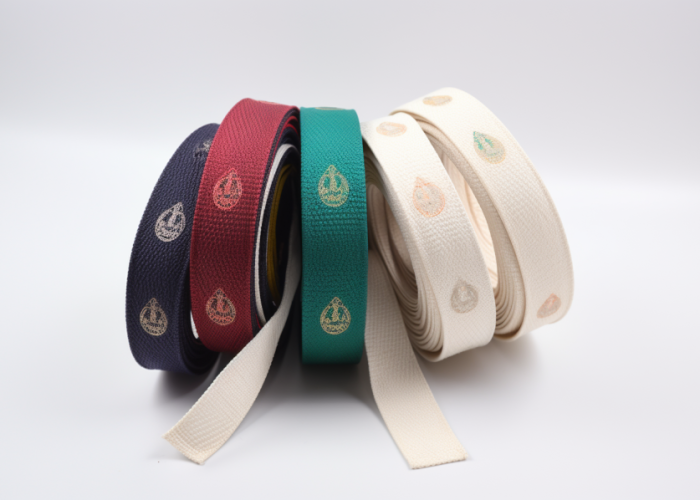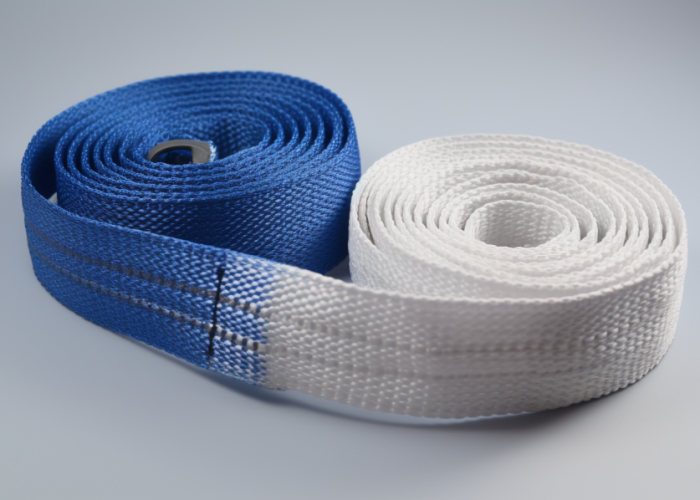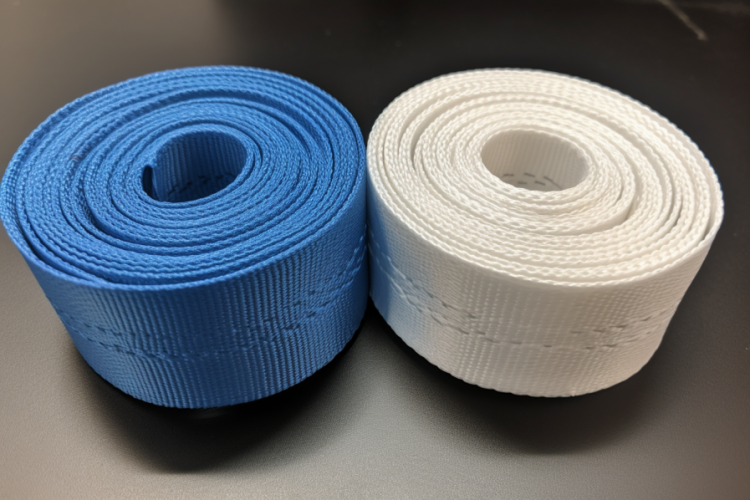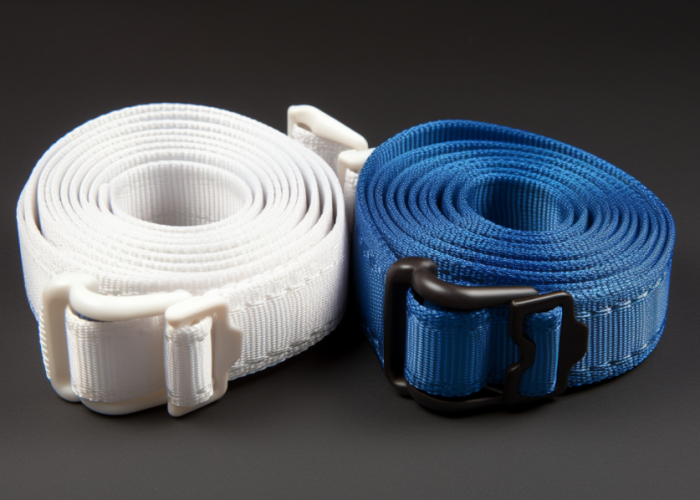As a custom webbing manufacturer, we regularly receive inquiries from product developers asking about white nylon strap suitability for their designs. This guide addresses common specification questions and performance concerns to help you make informed material decisions for your products.
White nylon strap is a flat woven synthetic material made from nylon fibers, specifically colored white and designed for various functional and decorative applications. It offers tensile strengths of 3,000-5,400 pounds with good flexibility and cost-effectiveness.
Explore key material properties, trade-offs, and application tips to optimize your product design with insights from our manufacturing expertise.


Webbing manufacturing expert with 15+ years of experience helping product developers build high-performance straps for industrial, medical, and outdoor use.
White nylon strap offers 3,000-5,400 pounds tensile strength with 380-420°F temperature tolerance and superior abrasion resistance for reliable load-bearing performance.
Key material properties include:
White nylon consistently holds its rated load capacity across normal temperature ranges, making it reliable for safety-critical applications. The material resists fraying and wear even with constant rubbing against buckles, D-rings, or rough surfaces – a key advantage over cotton webbing that deteriorates quickly under friction.
From our manufacturing experience, white nylon performs exceptionally well in pet collars, safety harnesses, and luggage straps where consistent strength matters. However, extended sun exposure weakens the material by 15-20% per year, and certain chemicals can cause degradation. This makes nylon perfect for indoor products or occasional outdoor use where you need strong, lightweight webbing.
We test all nylon webbing to industry standards to ensure consistent quality. The material bounces back to its original shape after stretching, so it won’t become loose or saggy over time like some alternatives.
Design Takeaway: Choose white nylon strap when you need reliable strength above 3,000 pounds in temperatures below 300°F. For products with constant sun exposure, consider polyester webbing instead, or ask us about UV-resistant treatments for extended outdoor durability.

White nylon strap is available in widths from 1 inch to 2 inches, with thickness options ranging from lightweight to heavy-duty depending on your product’s load requirements and comfort needs.
Available width and thickness options include:
Width selection directly impacts both strength and user comfort. Wider straps spread weight more evenly, reducing pressure points on users or pets, while narrower options work better when you need to minimize bulk and visibility. A 2-inch strap can handle significantly more weight than a 1-inch version of the same material.
From our manufacturing experience, 1-inch straps work well for dog leashes and light equipment, while 1.5-inch straps are popular for safety harnesses and medium-duty cargo applications. The 2-inch width is typically reserved for heavy-duty lifting straps, industrial safety equipment, and applications where maximum weight spreading is critical.
Thickness affects flexibility and comfort – thinner straps bend more easily around corners and buckles, while thicker options provide additional durability for rough use. Consider your buckle and hardware sizes when selecting width, as all components must match your strap width.
Design Takeaway: Choose 1-inch width for loads under 2,000 pounds, 1.5-inch for moderate applications up to 3,500 pounds, and 2-inch for maximum strength applications. Match thickness to user comfort needs – specify thinner options for direct contact applications and heavier thickness for industrial use.
White nylon strap has limited outdoor suitability due to sun damage and moisture absorption, losing 15-20% strength annually under constant sun exposure, making it better suited for indoor or occasional outdoor applications.
Outdoor performance characteristics:
Nylon’s biggest outdoor limitation is sun sensitivity. Constant sunlight breaks down the material, causing the webbing to become brittle and lose strength. Unlike polyester, which keeps most of its strength under sun exposure, nylon requires protection or replacement for long-term outdoor use.
From our manufacturing experience, customers using white nylon straps for outdoor furniture, marine applications, or permanent installations often experience early failures. The material works well for camping gear, temporary outdoor setups, or products stored indoors between uses. Rain and humidity cause temporary strength reduction while wet, but performance returns when dry.
For products exposed to weather for more than 6 months continuously, we typically recommend polyester webbing or treated webbing that resists sun damage. However, nylon remains an excellent choice for indoor applications or outdoor gear that’s used occasionally.
Design Takeaway: Avoid white nylon strap for permanent outdoor installations or products with constant sun exposure. Choose polyester webbing for outdoor applications or consider sun protection treatments. White nylon works well for indoor products, occasional outdoor use, or items stored away from direct sunlight.

Nylon webbing offers 20-30% higher tensile strength than polyester but polyester provides superior UV resistance, making nylon ideal for high-strength indoor applications while polyester excels in outdoor environments.
Key performance comparisons:
The strength advantage makes nylon the preferred choice when maximum load capacity is the primary concern. Nylon’s superior flexibility also makes it more comfortable for applications involving direct contact with users or pets, as it conforms better to curves and movement.
From our manufacturing experience, customers appreciate nylon’s cost advantage for high-volume production runs where budget matters. The material’s softer feel makes it popular for pet collars and safety harnesses where user comfort is important.
Water absorption creates different user experiences – nylon can feel slightly damp in humid conditions, while polyester maintains a consistent feel. Stretch and recovery characteristics differ significantly – nylon returns to its original length better after being stretched, while polyester may show slight permanent elongation under extreme loads.
Design Takeaway: Choose nylon for maximum strength and comfort in controlled environments where cost efficiency matters. Select polyester when consistent performance across varying conditions is more important than peak strength.
White nylon strap performs best in pet accessories, indoor safety equipment, and consumer products requiring high strength-to-weight ratio where its superior tensile strength and flexibility provide optimal performance.
Ideal application categories:
Pet product manufacturers consistently choose white nylon for its combination of strength, flexibility, and cost-effectiveness. The material handles pulling forces from large dogs while remaining comfortable against fur and skin. Its clean white appearance works well for professional and medical applications where visibility and cleanliness matter.
From our manufacturing experience, luggage manufacturers appreciate nylon’s strength for handles that must support heavy loads repeatedly. The material’s flexibility prevents cracking at stress points where rigid alternatives fail. Medical applications benefit from nylon’s easy cleaning and comfortable feel against skin.
Safety equipment applications leverage nylon’s superior strength for extra security margins in critical applications. Sports and fitness uses take advantage of nylon’s stretch recovery and durability under repeated stress cycles.
Design Takeaway: Specify white nylon strap for applications prioritizing maximum strength and user comfort such as safety equipment, pet products, and consumer goods where performance and cost efficiency are both important considerations.

White nylon strap can be custom manufactured with specific widths, thicknesses, treatments, and quality specifications, with minimum order quantities typically starting at 1,000 yards depending on customization requirements.
Custom manufacturing options include:
Custom specifications allow product developers to optimize webbing performance for specific applications. Narrower widths work well for lightweight products, while wider options provide maximum strength distribution. Thickness customization balances flexibility needs with durability requirements for different use cases.
From our manufacturing experience, edge treatments significantly impact product longevity and appearance. Heat-sealed edges prevent fraying and provide clean aesthetics, while sewn edges offer traditional finishing for specific applications. Custom length cutting reduces assembly time and material waste for high-volume production runs.
Quality control includes tensile strength testing on every batch to ensure consistent performance meeting your specifications. We maintain detailed records for traceability and provide certification documentation for safety-critical applications requiring compliance verification.
Lead times typically range from 2-4 weeks depending on complexity and quantity. Minimum orders vary based on customization level – standard modifications may require lower minimums while unique specifications need larger quantities to justify production setup costs.
Design Takeaway: Custom manufacturing enables performance optimization and cost efficiency for specific applications. Standard options work for most needs, but custom specifications provide competitive advantages when standard webbing doesn’t meet exact requirements.
White nylon strap provides excellent strength and flexibility for indoor applications, pet accessories, and safety equipment, but requires polyester alternatives for outdoor use due to UV sensitivity. Its cost-effectiveness and superior tensile strength make it ideal for controlled environments. Contact us to explore manufacturing solutions tailored to your white nylon strap requirements.
White nylon strap can handle 3,000-5,400 pounds tensile strength depending on width and thickness. Wider straps distribute load better – 2-inch width provides maximum capacity while 1-inch works for lighter applications up to 2,000 pounds.
White nylon strap typically costs 10-15% less than polyester webbing, making it cost-effective for high-volume production runs. While polyester offers better UV resistance, nylon provides superior strength-to-cost ratio for indoor applications and controlled environments.
We provide ASTM D5034 tensile strength certification, ISO 9001 quality documentation, and OEKO-TEX Standard 100 testing for harmful substances. REACH compliance documentation is available for European markets, with custom testing protocols for specific industry requirements.
Avoid white nylon strap for marine equipment, permanent outdoor installations, and chemical processing applications. Industries requiring constant UV exposure resistance, chemical resistance, or outdoor durability should specify polyester or treated alternatives instead.
Yes, we offer engineering consultation during the design phase to optimize specifications, prevent failure modes, and suggest cost-effective improvements. Early collaboration typically results in 15-20% cost savings and improved product performance through manufacturing expertise.
Minimum orders start at 1,000 yards for standard specifications, with higher quantities required for unique customizations. Lead times range from 2-4 weeks depending on complexity, width requirements, and current production schedule.